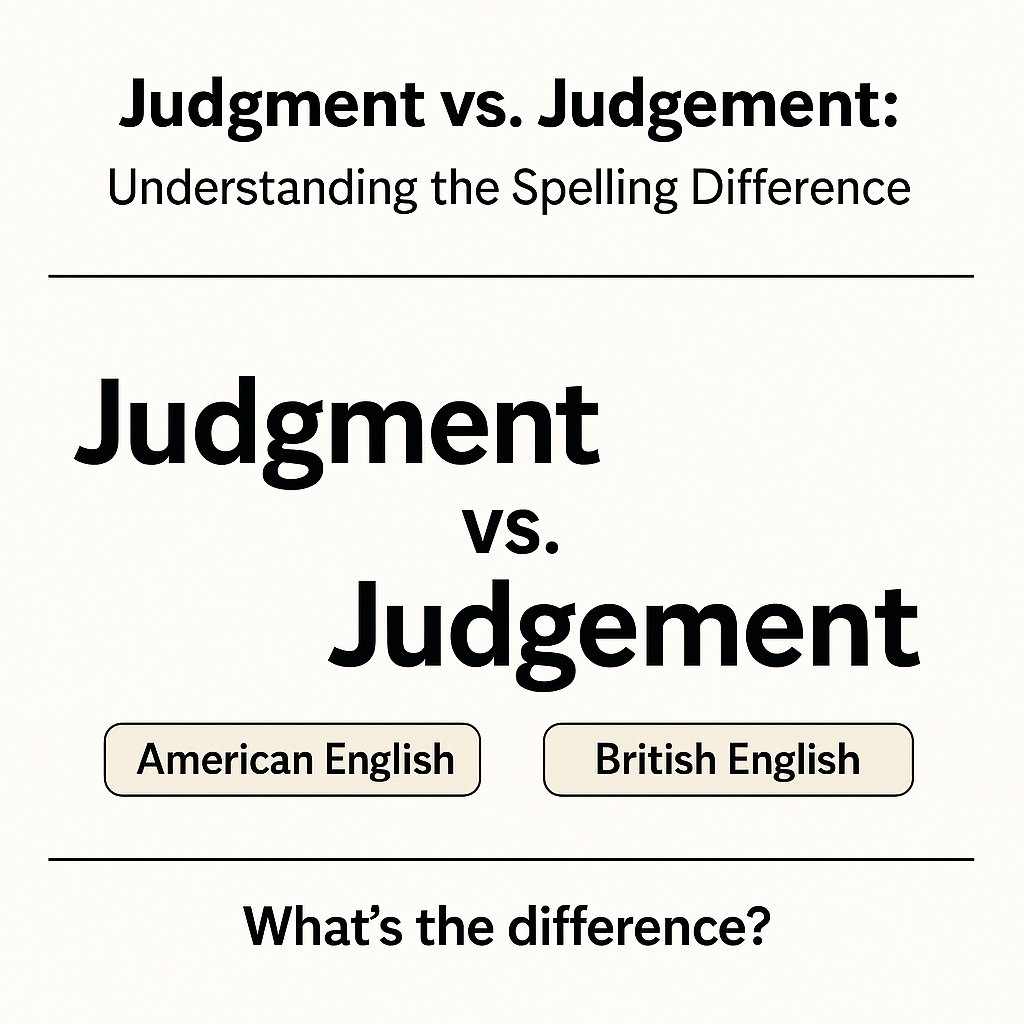Judgment vs. Judgement

In the courtroom of language, the battle of “judgment” vs. “judgement” often sparks confusion among writers. Which one is correct? The simple answer is both, but which one you use depends largely on where your audience is.
The spelling “judgment” is the preferred form in American English, while British English typically uses “judgement”—except in legal contexts, where “judgment” remains the standard even in the UK. Although both versions share the exact meaning, that is, the ability to make considered decisions or form sensible opinions, the spelling choice reflects regional writing conventions.
This guide will help you understand when to use judgment and when judgement is appropriate, giving you the confidence to make the right choice every time.
Related post: Assure vs. Ensure vs. Insure: Know the Difference
Grammatical Explanation of Judgment vs. Judgement
Both judgment and judgement are nouns, and their definitions are identical: they refer to the process of forming an opinion, decision, or conclusion after careful consideration. The difference lies entirely in spelling preference based on geographical region, not in grammar or meaning.
- Judgment is the correct spelling in American English across all contexts—legal, academic, and everyday writing.
- In British English, both spellings are acceptable, but “judgment” is still favoured in legal writing, while “judgement” appears more often in general or non-legal contexts.
The word comes from the verb “judge,” and historically, the addition of the ‘e’ was common in early English. Over time, American English simplified the spelling by dropping the ‘e,’ while British English retained both options depending on usage.
Real-Life Examples of Judgment and Judgement
American English Examples (Judgment):
- The court’s judgment was delivered after a lengthy trial.
- People recognize her for her sound judgment in challenging situations.
- His judgment was affected by personal bias.
British English Examples (Judgement / Judgment):
- The judge’s judgment was final and could not be appealed. (Legal context)
- Trust your own judgement when making important life choices. (General writing)
- Poor judgement in leadership often leads to serious consequences.
Incorrect Usage Examples:
- American legal document: The judgement of the court… (Incorrect; should be “judgment”)
- British legal ruling: The High Court issued the judgement… (Incorrect in legal context; should be “judgment”)
Common Mistakes with Judgment vs. Judgement
A common mistake is assuming “judgement” is always correct in British English or believing that “judgment” is strictly American. In truth, British legal writing still prefers “judgment”, so mixing up the two spellings in this context is a frequent error.
Another issue is inconsistency. Switching between “judgment” and “judgement” within the same document can weaken your writing. Choose one spelling based on your audience and stick with it. Always check your language settings and follow the appropriate style guide—whether APA, Oxford, or Chicago Manual of Style.
To avoid mistakes, consider referencing trusted sources like the Cambridge Dictionary or Merriam-Webster.
Memory Tips to Remember Judgment vs. Judgement
Here are some simple strategies to help you remember the difference:
- Judg(e)ment with an ‘e’ for England (British English)
- Judgment without the ‘e’ for America (American English)
If your audience is global or if you’re unsure which spelling to use, consider using British English (“judgement”) which most people view as ‘safer’ outside formal legal contexts.
Conclusion: Judgment vs. Judgement Made Simple
Whether you choose judgment or judgement, understanding the regional preference makes your writing clearer and more credible. In American English, always use judgment. In British English, use judgment for legal writing and judgement for general contexts.
By mastering these spelling differences, you sharpen your writing, respect your readers’ expectations, and ensure consistency across your work. For more spelling tips and writing guides, explore our series on commonly confused words.